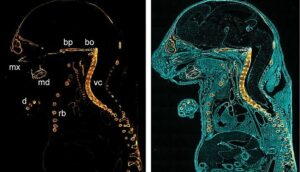Think of an embryo’s beginnings, and an egg, sperm and womb probably come to mind. Now think again. Using mouse stem cells cultured in a petri dish, scientists in the UK and Israel have successfully created a synthetic model of an embryo, which, like the biological kind, developed a brain, a beating heart, and an intestinal tract.
Stem cells are the body’s raw material, with the potential to become many types of cells. Both mice and human stem cells can do this, though they go about it differently.
The researchers hope their embryo model will help future mothers by deepening understanding of why some pregnancies fail early on while others thrive. In addition, the “embryoids” could help reduce the use of animals in research and could one day supplement the limited supply of transplantable human organs with synthetic ones.
“Instead of developing a different protocol for growing each cell type — for example, those of the kidney or liver — we may one day be able to create a synthetic embryo-like model and then isolate the cells we need,” said professor Jacob Hanna of the molecular genetics department at Israel’s Weizmann Institute of Science. “We won’t need to dictate to the emerging organs how they must develop. The embryo itself does this best.”
more at cnet.com
Ask me anything
Explore related questions





